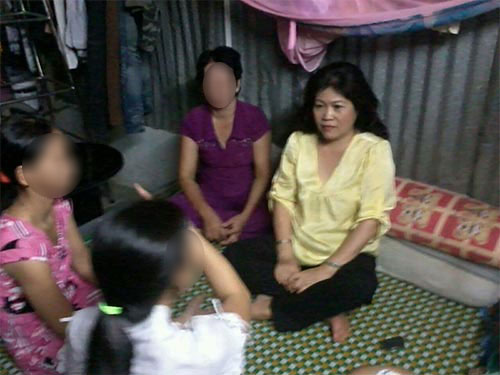Surrogacy services Though not yet legally recognized, surrogacy has become a special service in  The reporter (right) met with a surrogate mother in Surrogacy involves an arrangement whereby one women is hired by a couple to carry a pregnancy on their behalf. It is usually done for medical reasons, when a woman wishing to have a child is physically unable to carry a fetus, or is told that doing so may be dangerous. In some cases she may be too old to bear a child. Sometimes the reasons are non-medical: a young woman wishing to avoid the “ravages” of pregnancy on her body, for example. Or a public servant looking avoid the penalty for having a third child. In most cases, in-vitro fertilization is used to create a fertilized egg from the couple, which is then implanted in the womb of the surrogate. Hence the child generally bears the genetic makeup of the hiring couple, with no genetic relation to the surrogate. Many couples are driven to search out a surrogate mother, rather than adopt a child, to satisfy their desire to have progeny who continue the family’s genetic line. $25,000 for 9 months and 10 days After leaving their home in the southernmost To earn an additional VND100,000/day ($5), Tham worked as a helper for a rich family in the Phu My Hung residential area in District 7 for five hours a day. Tham’s employer was a model whose husband, an older man, was usually away on business. One day, her employer said she wanted to talk to Tham privately. She confided to Tham that the man presented as her husband was actually her boyfriend, and was married. The model wanted to have this rich man’s child to “tie” him to her. However, as she was fearful of losing her shapely figure, she did not want to be pregnant. She then proposed that Tham, who was still young and healthy, carry the child for her. In return, Tham would receive VND500 million ($25,000). Tham, arriving home that evening, told her husband about the model’s offer. At first, he was outraged, and even yelled at Tham. After a bit of reflection and cooling off, however, the VND500 million figure, inconceivably huge by the couple’s standards, swayed him in the other direction. Tham returned to the model and agreed to be a surrogate for the woman’s child. Tham received VND20 million ($1,000) in advance for medical checkups. After several tests, Tham was implanted with embryos from the egg and sperm of the model and her boyfriend. Then, she stayed at home to rest. A month later, she tested positive for pregnancy. During the course of the pregnancy, Tham received VND10 million ($500) dong per month to buy food and other necessities. The model asked that Tham completely rest and spend all her time taking care of the fetus. Two days before giving birth, Tham was brought to a foreign-owned hospital for a caesarean, under the name of the model. On the day of the delivery, Tham was given a sedative to put her to sleep. Sometime later, after regaining consciousness, she opened her eyes to see only her husband in front of her. The baby, upon delivery, had been whisked away by the model. Tham tried to hide her tears, whispering to her husband that she had only wished to see the child once. Her husband did his best to console her: "Well, he is not our son. They only borrowed your womb to have him. I also hoped to see him once but they took him right away from the operating room”. VND500 million is a small fortune for Tham’s poor family, enough to change their lives. The couple made plans to buy a small house on Two weeks after giving birth, Tham asked her husband to take her to the model’s house to visit the baby. When they rang the bell, a strange woman came to the door. She was the new renter, she said. The model was gone. Surrogacy brokers Tam Bia meandered through a small alley beneath the Playing a middle-aged woman who could not become pregnant, a reporter asked Tam Bia to find a surrogate mother for her. Tam Bia asked for VND100 million ($5,000) in commission. She explained that her standard commission is VND50 million if the client has her own eggs and VND100 million for those who don’t because, in that case, she has to persuade the surrogate mother to donate her own eggs. That can end up being more emotionally wrenching than giving up a baby with no genetic connection. After many successful cases, Tam Bia says: "I do this job to help others. People who need money can have money and those who need children can have children". NLD |
↧
Article 2
↧